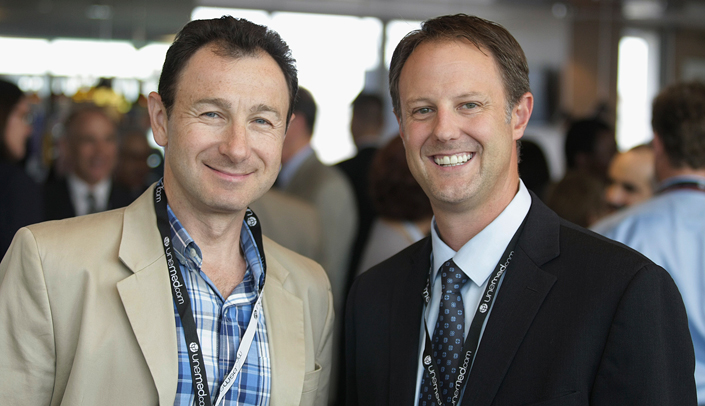Researchers at UNMC are among the most inventive in the country, according to information provided to an exclusive audience of administrators, faculty and staff during UNeMed Corporation’s shareholder meeting Tuesday evening at T.D. Ameritrade Park’s Skybox Lounge.
The meeting featured remarks from UNMC Chancellor Jeffrey P. Gold, M.D., who outlined his support for commercialization efforts. He was followed by Michael Dixon, Ph.D., the president and CEO at UNeMed, the technology transfer and commercialization arm of UNMC.
By the numbers
Dr. Dixon presented several other “core metrics” highlighting UNeMed activities throughout fiscal 2014, including:
- 78 new inventions disclosed.
- 315 material transfer agreements.
- 93 confidential disclosure agreements.
- 16 patents issued.
- 14 licensing agreements.
UNeMed also has focused on expanding its international footprint. In the past two years, UNeMed signed licensing agreements with companies in six different countries.
Dr. Dixon called UNMC researchers an “inventive group,” citing the most recent data from the Association of University Technology Managers, which shows UNMC’s 7.48 inventions for every $10 million spent was fifth in the nation.
“We are definitely on the national radar screen,” said Dr. Gold, referring to a national poll that predictably showed people most often associated the University of Nebraska with football. The second thing they connected to Nebraska was health care.
Dr. Dixon also noted that 75 UNMC technologies are currently under license, with 39 helping improve lives as products on the market.
Improving the “human condition” is a key component of Dr. Gold’s vision for UNMC research. He told an estimated crowd of 80 that research doesn’t end after publishing a paper in an academic journal or when a grant expires.
“The research is done when a human life is changed,” he said.
“It’s the people in this room that carry out the final step, that take it from the laboratory into the realm of reality, so it changes the lives of patients today and tomorrow and for generations and generations to come.”
Dr. Dixon reported $1.17 million in total revenue during the previous fiscal year. He said it was comparable to Northwestern University before a successful licensing deal netted the Chicago-based Big Ten Conference member more than $2.3 billion with the development of Lyrica, an anti-seizure medication.
“That’s why we’re going to keep taking at-bats,” he said. “Because it takes just one swing for a home run.”
Dr. Gold concluded his remarks with the idea that research funding was a necessary investment for greater prosperity and health.
“It’s an investment that will convert this intellectual property — and all of your hard work in your research labs — into the future cures and the ways we prevent disease in our country and in our community,” he said.
